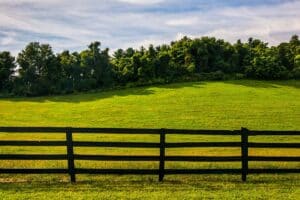According to September LANDTHINK Pulse results, 89% of respondents indicated that game wardens SHOULD NOT have the right to come on private property to search and surveil without permission, without probable cause, and without a warrant. Most everyone knows that you need permission to be on private land, and written permission is recommended. So if “Private Property” or “No Trespassing” signs ring your property, it sends the message that no one can be on your land without authorization. Should this apply to game wardens?
Last month, the September Pulse asked: Should game wardens have the right to search and surveil private property without a warrant?

Game wardens, or wildlife officers, are primarily responsible for enforcing laws pertaining to the hunting, fishing, and trapping of wild animals. In most states, game wardens have a unique power in law enforcement. Federally enabled by court precedent and established legal doctrines, they have a greater ability to conduct warrantless searches than either the police or administrative inspectors. They have general law enforcement authority, and can make arrests and hand out citations for violations of most laws, with just as much- if not more- authority than state police. One of the biggest exceptions is how they act relating to the Fourth Amendment, which prohibits warrantless or unreasonable searches.
Game wardens have broad search powers. A game warden may enter private property without permission and without a warrant, even if there is a posted sign. Typically, the only areas under protection from a warrantless search are your home, porch, and potentially your driveway. In most states, game wardens may enter public or private property at any time and can search without a warrant, without any level of suspicion of illegal activity. If a game warden reasonably believes that you or someone else is engaged in a regulated activity, they can inspect any device used to hunt or collect a wildlife resource. Game Wardens in some states are going further than simply trespassing and surveilling hunters in person, they set up up trail cameras on private property without the landowner’s knowledge or permission.
Many Americans would probably think that a game warden setting up a trail camera on private land is a clear violation of the Fourth Amendment protections against “unreasonable searches and seizures” expressed in the Bill of Rights. But for roughly a century, the Supreme Court of the United States (SCOTUS) has ruled that private land is not private, and the Fourth Amendment only applies to an individual’s immediate dwelling and curtilage, and not surrounding land. Curtilage is an arcane term loosely translated as the area directly around a home, or generalized, the yard.
In 1924, a major case called Hester v. US came before the Supreme Court about these Fourth Amendment protections. This case set up the Open Fields framework when SCOTUS declared the U.S. Constitution does not extend to most private land: “the special protection accorded by the Fourth Amendment to the people in their ‘persons, houses, papers, and effects,’ is not extended to the open fields.” Significantly, Open Fields is translated beyond its literal sense, and basically is defined as general acreage: woods, fields, farmland, and more. It currently allows authorities access to any open fields without a warrant, or even probable cause.
The “open fields doctrine” is based on the theory that people do not have a legitimate expectation of privacy in activities occurring in open fields, even if the activity could not be observed from the ground except by trespassing in violation of civil or criminal law.
Two hunting clubs in Pennsylvania are currently challenging the issue. In December 2021, the Punxsutawney Hunting Club and the Pitch Pine Hunting Club, which collectively own and operate over 5,000 acres of forested land, sued the Pennsylvania Game Commission (PCG). Represented by attorneys from the Institute for Justice (IJ), their lawsuit alleges that PGC game wardens routinely ignored “No Trespassing” signs and locked gates in order to spy on club members without a warrant.
The lawsuit names both the PGC and game warden Mark Gritzer. The clubs complain that for years, Gritzer and other wildlife officers have regularly entered and searched their privately owned lands to check club members for compliance. This is fairly standard practice, but evidence turned over by the state revealed that in addition to surveilling hunters in person, wildlife officers had installed a trail camera on the property without the club’s knowledge or permission.
The Pennsylvania Game Commission (PGC) admitted to surveilling club members via a no-warrant trail camera. PGC behavior, according to the lawsuit, is a direct violation of Pennsylvania’s state constitution, which in Article 1, Section 8, explicitly protects “persons, houses, papers, and possessions” from unreasonable (i.e., warrantless) searches.
Similar lawsuits were filed in Texas and Tennessee. In 2018, a Texas man sued Customs and Border Protection (CBP) and the Texas Rangers for placing a surveillance camera on his property without his permission and they threatened to arrest him when he removed it. Although his ranch is nowhere near the Mexico border, CBP has the authority to operate anywhere within 100 miles of any international border.
In April 2022, Tennessee landowners Terry Rainwaters (136 acres) and Hunter Hollingsworth (95 acres) joined forces with the Institute for Justice (IJ) to sue the Tennessee Wildlife Resources Agency (TWRA) for ignoring their “No Trespassing” signs by entering and installing cameras on their land that serve as living quarters and farmland (in Rainwaters’ case), as well as hunting ground. On March 22, the Benton County Circuit Court ruled that a statute authorizing warrantless trespassing and surveillance by Tennessee game wardens is unconstitutional.
The Circuit Court ruled that the law enabling the searches violates the Tennessee Constitution, which Tennessee courts have long held gives landowners more protection than the U.S. Constitution. Now, game wardens in Tennessee must have a warrant to conduct surveillance on private land and may not rely on the power of the federal Open Fields doctrine.
Since the 1984 United States Supreme Court decision in Oliver v. United States, Mississippi, Montana, New York, Oregon, Vermont, and Washington are the only states in the U.S. that do not honor the Open Fields Doctrine.
Briefing before the court is yet to begin in the Punxsutawney-Pitch Pine lawsuit. The outcome of the Pennsylvania case will be one worth watching, as it could potentially set a new legal precedent.
Our informal online survey revealed that an overwhelming 89% of the LANDTHINK audience feels strongly that game wardens SHOULD NOT have the right to search and surveil private property without a warrant. Only 11% answered “YES”, indicating that game wardens SHOULD have the right to search and surveil private property without a warrant.
Do you have a suggestion for next month’s Pulse question? Submit your question and we might choose yours!
This content may not be used or reproduced in any manner whatsoever, in part or in whole, without written permission of LANDTHINK. Use of this content without permission is a violation of federal copyright law. The articles, posts, comments, opinions and information provided by LANDTHINK are for informational and research purposes only and DOES NOT substitute or coincide with the advice of an attorney, accountant, real estate broker or any other licensed real estate professional. LANDTHINK strongly advises visitors and readers to seek their own professional guidance and advice related to buying, investing in or selling real estate.










Nobody actually owns any land inside the US or any of its territories. You’ve never been more than caretakers. Doubt me? Try not paying taxes and the owner will show you who owns all property in our nation…or anywhere on earth.
True!
On the contrary. You have to own it to owe taxes. When a land owner fails to pay taxes the land is confiscated. Again, one must own it for it to be confiscated.